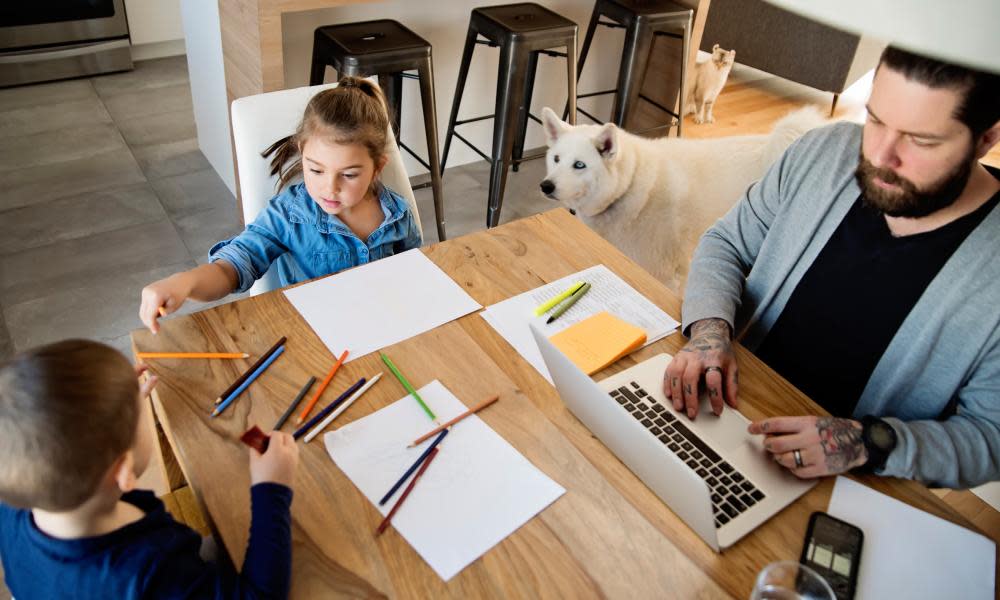How WFH has shown us the real lives behind the job titles

This may come as a surprise, but I have a day job of sorts (I’m an editor for a global group of employment lawyers). I know that nice Mr Sunak said freelance journalists earn about £200,000 a year when he announced his support package for the self-employed last month, but I don’t know what happened to mine. Was I mis-sold a heap of PPI? Maybe I bought too many avocado toasts and flat whites. Isn’t that how my millennial brethren mislaid the houses they were supposed to own? Either way, my side hustle is indispensable.
Apologies for this unlovely insight into how the word-sausage gets made, but lots of people who write full time have a bit on the side, doing things we wouldn’t necessarily boast about at literary parties. It’s hardly news that journalism is beleaguered, rates low and work spread thin. I occasionally used to beat myself up about not having the courage and talent to live entirely from my creative endeavours; no longer. Now, I’m simply grateful, more than ever, for the stability and structure my side hustle brings.
The crisis hasn’t really changed the way I work – I have been #wfh for more than a decade – but I’m intrigued by how it has changed the way we interact. I have never met most of my colleagues, but I find myself feeling oddly tender towards them. The glib “Thanks and kind regards” I used to send their inbox avatars no longer cuts it; I’ve adopted a genuinely sincere “Best wishes”. Usually strictly business, we have taken to tentatively slipping a personal touch into emails. “Take care,” someone writes from Luxembourg. “Stay safe,” ends a message from Mexico.
I’m fascinated by a sparsely populated Instagram feed with pictures of us in makeshift home offices, laptops on piles of books and balanced on the corners of kitchen tables (physios will have a field day when we all get out). Who would have imagined the rigorously professional X has a small fluffy lapdog? It’s an odd and rather lovely consolation to have work humanised like this; to see we are parents or cat owners; to inspect each other’s mugs. We’re all South Korea commentator Robert Kelly or shadow chancellor Anneliese Dodds now, kids waltzing through our Team meetings and making a mockery of our key performance indicators.
My side hustle is in one of the industries that is particularly busy currently, so I have been working more or less non-stop since the first rumblings of Covid-19 hit Europe. Colleagues across the world are doing the same; I get emails on Saturday nights and Sunday mornings; at 4 or 5am on weekdays. I won’t say it’s been hard work, because anyone who is not putting their life and health in danger has forfeited the right to say that now. It’s not NHS hard; not Asda-checkout hard. I just get up every morning, sit at my computer and work all day; I had my first half-day off this weekend for a month.
My family are bemused at my commitment to keeping the hamster wheel of capitalism turning
This is the opposite of a complaint: it’s an acknowledgement of my great good fortune. It might be nice to do a wrist workout trying to lift The Mirror and the Light, or see if I can still murder an easy Chopin prelude, but it’s far nicer to have scaffolding for these shapeless days, and a bit of economic security.
My family are bemused at my commitment to keeping the hamster wheel of capitalism turning, but for me, work is identity and sanity. When my best friend and I fantasise about winning the lottery, she says she would stop working in an instant, but I can’t imagine happiness without it. Retirement is theoretical – I seem to have mislaid my pension, along with that £200,000 – but I dread the thought of it anyway.
It goes without saying that only some types of work can be a salvation: the ones that are safe, humanely organised and pay a living wage. Our current situation has created and amplified the gaping, uneasy gulfs in the way we work, as it has in so many things. The distribution of work is feast or famine and it’s as unfair as that of other resources. Key workers are frighteningly overburdened, keeping us safe, fed, alive; gig economy workers without job stability or sick pay are working past exhaustion and through illness. Meanwhile many have seen work vanish entirely, or become a logistical impossibility. Friends who invented themselves as nimble, multi-hyphen hustlers – more because permanent jobs were impossible to find than through any real conviction – made a virtue out of necessity. Now they are negotiating labyrinthine universal credit applications and facing a deeply uncertain future.
Can we do better? We must. We’ve now seen the real people behind the professional fronts we’ve been putting up; swapped grateful emojis with our delivery drivers and shy smiles with supermarket cashiers; cooed over our colleagues’ babies and spotted their grubby tea towels (just me? Maybe). Now we need to take that knowledge and use it to make work more human.
Follow Emma on Twitter @BelgianWaffling


